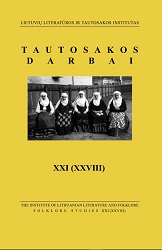LAIDOTUVIŲ RAUDA IR RAUDOJIMAS – ATLIKIMAS AR BŪSENA?
THE FUNERAL LAMENT AND LAMENTATION: PERFORMANCE OR A STATE OF MIND?
Author(s): Aušra ŽičkienėSubject(s): Customs / Folklore, Music, Sociology of Culture
Published by: Lietuvių literatūros ir tautosakos institutas
Keywords: lament; lamentation; creation and performance;
Summary/Abstract: Due to their structural peculiarities, laments are regarded as a marginal genre of the folk songs, constituting a separate subgroup, although their poetics is not really that different. The main difference separating laments from the rest of the folk song tradition lies in their construction: unlike the songs, laments are not constructed following the fixed patterns of content and micro or macro form (according to which the type of the song is recognized). The verbal text of lament is constructed by choosing motives appropriate to a certain situation from a conventional chest of ideas, formulae, images or loci communes (the sequence and number of these motives are irrelevant) and pulling them onto a regional (local) structural last. Therefore laments can be defined as instantaneous, one-off, impromptu compositions, created without any ready-made pattern, and as such, highly dependent on the surroundings and the situation of their coming into being. The article aims at comparing laments, recorded in the natural and in the artificial (i.e. created upon an instigation of the collector) situations, and at positioning laments with regard to such categories as creation and performance, poetical composition and mental state. For that purpose, analysis and comparison of five sound or video recordings of Lithuanian funeral laments, their transcriptions, situations and circumstances of lamentation was carried out.
Journal: Tautosakos darbai
- Issue Year: 2005
- Issue No: 29
- Page Range: 154-165
- Page Count: 12
- Language: Lithuanian

